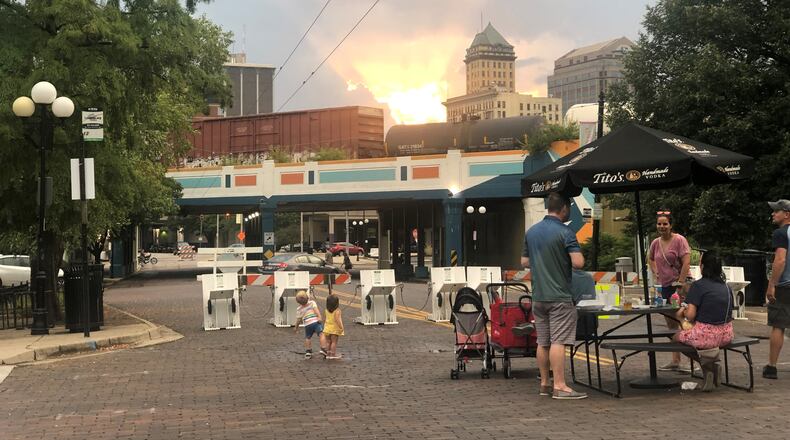This “has got to be one of the headlines for the whole survey,” said Steve Raabe, owner of Maryland-based OpinionWorks, which conducted the city-funded survey. “It is amazing.”
But the overwhelming majority of residents are unhappy with the condition of city streets, and satisfaction with police and waste collection services has declined.
Many residents remain concerned about gun violence in their neighborhoods and the state of race relations.
In May, the city mailed out questionnaires to 12,000 randomly selected homes containing about 75 questions.
Residents also had the option of completing an online survey, and the city received about 1,200 total responses.
The city surveyed its residents each year from 2016 to 2019, but took a break last year during the COVID pandemic. The city spends $35,000 to $45,000 on the survey each year.
About 57% of residents say they are satisfied with Dayton as a place to live; 54% are satisfied with their neighborhoods; and 53% say the city is headed in the right direction, the results show.
Those are the highest satisfaction levels on these topics since the city reintroduced the survey in 2016.
By comparison, one-quarter of residents say the city is headed in the wrong direction; nearly a third say they are dissatisfied with their neighborhoods and about one in five are discontent with the city as a place to live.
Some core indicators have been trending in the right direction, and other measurements of community well-being also show improvement, said Raabe, with OpinionWorks.
About 70% of Dayton residents said they would support an immigrant family moving in next door — which Raabe says is a remarkable 12 percentage point increase from 2019.
Dayton launched an initiative to become a welcoming and immigrant-friendly community in 2011, and it has seen strong growth in its immigrant population.
New Census data show that one in seven residents in northeast Dayton are foreign born, said Hilary Ross Browning, budgets and grants supervisor with the city.
That part of the city has seen an enormous increase in the share of residents who say they support living next to an immigrant family, she said. The area is home to many members of the Ahiska Turkish community, as well as other ethnic groups.
Community partners, organizations and Welcome Dayton deserve credit for helping change attitudes about immigrants by bringing people together to interact and build relationships, said Melissa Bertolo, who served as the Welcome Dayton coordinator between 2012 and 2017.
Immigration is a divisive topic across the country, but Bertolo said local community members learn to accept and appreciate their neighbors of all backgrounds when they connect, develop relationships and work toward common interests.
Welcoming communities like Dayton have policies and programs in place that try to ensure people feel included, valued and that they belong, said Bertolo, who lives in Dayton and is the certified welcoming director for Welcoming America, a nonprofit focused on helping communities become more inclusive.
“I think a lot of it comes down to thinking about what kind of infrastructure is there to make sure that there opportunities for people to come together, to learn about each other and to be included,” she said.
But the survey showed some areas of concern.
It found that 65% of residents are dissatisfied with the condition of streets and pavement — which is basically unchanged from 2019.
Dissatisfaction with roadways increased between 2017 and 2019, even though the city says it increased spending on residential roads during that period.
Dayton voters approved an income tax hike in 2016 that was expected to generate an additional $11 million in annual revenue, and the city promised to invest some of the new proceeds into residential street resurfacing.
But many residents say the roads are still in terrible shape and complain about potholes and bumpy rides.
Only 15% of residents said they were pleased with the state of the roads, down 3 percentage points from the last survey.
Satisfaction with the city’s waste collection services slipped 10 percentage points since 2018, falling to 61%.
Waste collection has had severe labor shortages and COVID-19 related disruptions, including supply chain issues, said Ross Browning.
This newspaper last spring reported that hundreds of Dayton households were waiting for new trash containers because of delays and an ongoing backlog.
More residents report feeling safe in their neighborhoods at day or night, but nearly two-thirds of Daytonians are very or somewhat concerned about the possibility of gun violence in their neighborhoods.
Only about one quarter of residents said they think race relations are excellent or good. Six in 10 said they are just fair or poor.
About the Author




